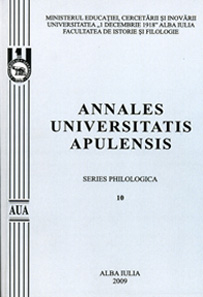CATÉGORIES FLOUES ET PROTOTYPICALITÉ
FUZZY CATEGORIES AND PROTOTYPICALITY
Author(s): Oana Maria PăstaeSubject(s): Language and Literature Studies
Published by: Universitatea »1 Decembrie 1918« Alba Iulia
Keywords: fuzziness; vagueness; cognitive categories; prototype
Summary/Abstract: The aim of this article is both to expose some objections raised by the prototype theory and to demonstrate that, in spite of all, it is the most interesting theory due to its experiential, imaginative and ecological aspects of mind. First, we explain the difference between the classical theory and the prototype theory. The classical theory proposes a categorization based on features considered as a necessary and sufficient condition. For example, entities such as “birds” seem to share the same features such as “animal”, “feathers”, “wings”, and “laying eggs”. The prototype theory supposes that membership is construed by similarity to the best example – the prototype. In this case, entities such as “duck” which cannot swim or “penguin” which cannot fly will be part of the category “birds” since they share few of the above features with other kinds of birds. Such features, however, do not allow a clear distinction of other categories such as “snakes”, which lay eggs but are not birds. Rosch proved that categories are formed around prototypes. Some members seem to be central to the category because they have many of the features of the category in common, whereas others are more peripheral. The term prototype may refer either to objective properties of a category or to a hypothesized mental representation of a category formed during learning. Fuzziness results in prototype effects and leads to better and worse examples of a category. The boundaries of the categories are fuzzy in the prototype theory. Rosch’s theory leaves us with the impression that at some unspecified point beyond their periphery, categories fade into nowhere. Our aim is also to describe the concepts of fuzziness and vagueness. Finally, we proceed to expose a prototypical analysis of the cognitive category of joy. Emotions are cognitively based so cognition and emotions interplay. We can treat joy as a matter of language or as a matter of mind. We recognize the value of the prototype theory but we are going to see if joy can be analyzed in the prototype theory taking into account that a cognitive approach accepts that natural categories are graded meaning that they tend to be fuzzy at their boundaries. In structuring the cognitive category of joy it is sufficient only to consider the clear and salient centre of the category.
Journal: Annales Universitatis Apulensis. Series Philologica
- Issue Year: 11/2010
- Issue No: 3
- Page Range: 99-108
- Page Count: 9
- Language: French

